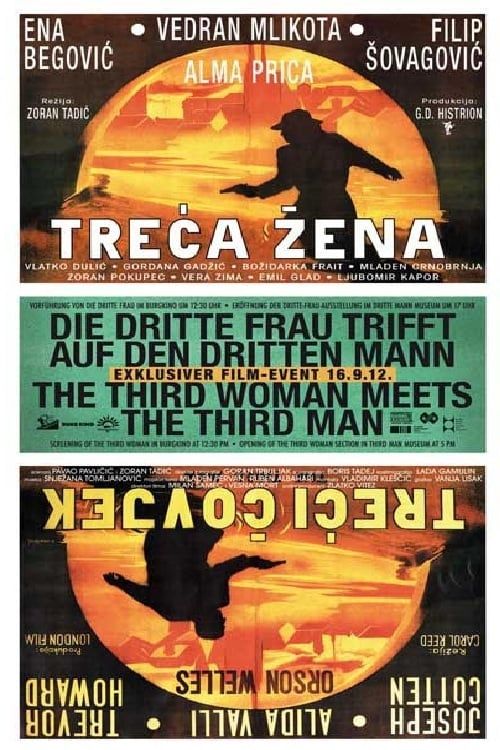
Pointless remakes aren't the exclusive domain of Hollywood. The Third Man, Carol Reed's 1949 British classic and one of the best films ever made, had its new incarnation in The Third Woman, a 1997 Croatian thriller directed by Zoran Tadić.
The plot of this film is set in Zagreb during Autumn of 1991, at a time when Croatia, following its declaration of independence, fought a war with secessionist Serb rebels and their backers from the federal Yugoslav Army. The capital city of Zagreb was not directly affected by the war, but its citizens had to endure months of blackouts and air raid alerts. Hela Martinić (played by Ena Begović) is a Croatian émigré to Australia who returns to Zagreb, called by her old friend Vera Kralj (played by Alma Prica). Upon arrival, she finds that Vera was killed in an apparent traffic accident. In spite of police officials telling her to forget about it, she decides to investigate the mysterious circumstances of the whole affair. Encounters with Vera's friends, lovers, and associates slowly reveal that Vera was involved in organ smuggling.
Zoran Tadić is one of the most celebrated artists in the history of Croatia's film industry. His 1981 black-and-white thriller Ritam zločina was hailed as one of the best films ever made in the former Yugoslavia. It was followed by a series of thrillers, with the genre setting them apart from the rest of Croatian films. In the 1990s came the war, and Tadić stopped producing films, with a new generation of film watchers adopting the legend of "Croatian Hitchcock". It is an understatement to say that The Third Woman didn't live up to the expectation created by such a status.
The most obvious flaw in the film is the lack of creativity shown by Tadić's long-time associate and favorite scriptwriter Pavao Pavličić (one of Croatia's most respected writers, specialized in the crime genre). The word "remake" is too flattering for Pavličić's efforts - he borrows the plot, characters, and even some dialogue lines from The Third Man and mechanically implants them into the 1991 Zagreb setting, with little or no regard for plausibility. Some changes are necessary - penicillin smuggling becomes organ smuggling; the rivalry between Western Allies and Soviets in occupied Vienna is changed into a Good Cop/Bad Cop dynamic between regular Croatian police and redneck neo-Ustasha military intelligence. Some changes are unnecessary, like the genders of a couple of protagonists being different from those of their The Third Man equivalents. Some changes are difficult to explain, including the ending, which is different from the one in Reed's classic. The black-and-white cinematography, on the other hand, tries successfully to show that the bombed-out post-WW2 Vienna and 1991 Zagreb (spared from major destruction, both in 1941-45 and 1991-95 wars) have many things in common. However, once the novelty wears off, viewers are left with atrocious dialogue, unconvincing characters, and bad acting, which was always a weak spot of Croatian actors, trained for the stage rather than working in front of a camera.
The most interesting thing about The Third Woman is the way it reflects the ideological mindset of Tudjman's regime that ruled Croatia at the time - the film was produced by state television and Pavličić was a member of Tudjman's HDZ party. The link between Vienna and Zagreb isn't accidental - The Third Woman tries to convince viewers (especially those international) that Croatia and Austria belong to the same Catholic, West European culture and that the West must recognize Croatia as the noble defender of its eastern boundaries, threatened by evil, barbarous, Asiatic hordes, which include Serbs. Furthermore, the chief villains in the film are using the cover of a faith-based humanitarian NGO, comprised of former Communists, whose premises are, according to the film, "ex-territorial". This again fits the Tudjmanist worldview – only Catholics can be loyal Croats, while foreign NGOs that try to promote things like human rights and democracy in Croatia are nothing but a convenient cover for sinister enterprises at the expense of the Croatian people.
Despite a few bright spots, The Third Woman is undoubtedly a failed effort that could work only as a sad reminder of a traumatic chapter of Croatian history. Carol Reed's classic deserved a much better form of appreciation.
RATING: 3/10 (+)
(Note: The text in its original form was posted in Usenet newsgroup rec.arts.films.reviews on November 24th, 2003)
Blog in Croatian: https://draxblog.com
Blog in English: https://draxreview.wordpress.com/
Brave browser: https://brave.com/dra011
BTC donations: 1EWxiMiP6iiG9rger3NuUSd6HByaxQWafG
ETH donations: 0xB305F144323b99e6f8b1d66f5D7DE78B498C32A7